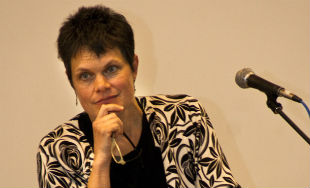De Amerikaanse dichteres Julia Mae Spicher Kasdorf werd geboren op 6 december 1962 in Lewistown, Pennsylvania. Zij groeide op in de buitenwijken van Pittsburgh. Haar ouders waren Doopsgezinden die ervoor hadden gekozen hun landelijke gemeenschap te verlaten om in een stedelijke omgeving te werken. Kasdorf bezocht Goshen College, maar behaalde haar B.A. en Ph.D. aan de New York University. Als student aan het Goshen College bezocht Kasdorf in 1982 China voor het Study-Service Trimester aan het Sichuan Teachers College. Ze publiceerde “Moss Lotus”, een gedichtenbundel geïnspireerd door haar ervaringen in China, als tweedejaars Engelse major in Gosen in 1983. Kasdorf behaalde haar B.A., M.A. in creatief schrijven, en Ph.D. van New York University (1997), waar ze onder meer studeerde bij dichter Yehuda Amichai. Kasdorf begon al tijdens haar middelbare schooltijd gedichten te schrijven. Haar eerste gepubliceerde gedicht verscheen in 1977 in Images Remembered II, een bloemlezing van het Poets-in-the-Schools-programma van de Pennsylvania Council on the Arts. In 1981 won ze de Scholastic Writing Awards met werk dat vervolgens werd gepubliceerd in Literary Cavalcade. In 1992 verscheen haar bundel “Sleeping Preacher”, gevolgd door “Eve’s Striptease” (1998) en “Poetry in America” (2011).
What I Learned From My Mother
I learned from my mother how to love
the living, to have plenty of vases on hand
in case you have to rush to the hospital
with peonies cut from the lawn, black ants
still stuck to the buds. I learned to save jars
large enough to hold fruit salad for a whole
grieving household, to cube home-canned pears
and peaches, to slice through maroon grape skins
and flick out the sexual seeds with a knife point.
I learned to attend viewings even if I didn’t know
the deceased, to press the moist hands
of the living, to look in their eyes and offer
sympathy, as though I understood loss even then.
I learned that whatever we say means nothing,
what anyone will remember is that we came.
I learned to believe I had the power to ease
awful pains materially like an angel.
Like a doctor, I learned to create
from another’s suffering my own usefulness, and once
you know how to do this, you can never refuse.
To every house you enter, you must offer
healing: a chocolate cake you baked yourself,
the blessing of your voice, your chaste touch.
Underground
During those years, petals were purged from their stems.
At first, greenhouse panes shattered
on chrysanthemum’s upturned buds;
clay pots crushed into shards.
Flowers in public squares
tilled under to grow turnips,
radishes, cabbages for the masses.
Seeds grew old and impotent in their packs;
bulbs shriveled and died in dark cellars.
Bonsais hunched under tea tables
in hushed, city apartments
while peasants risked only a ragged row
of marigolds along the mud walls of home.
Perhaps the perennials persisted,
their roots ignorant of the law —
stems, straining up through earth
to be trampled — or secretly saved,
petals pressed in books like isinglass icons.

Julia Kasdorf (Lewistown, 6 december 1962)
